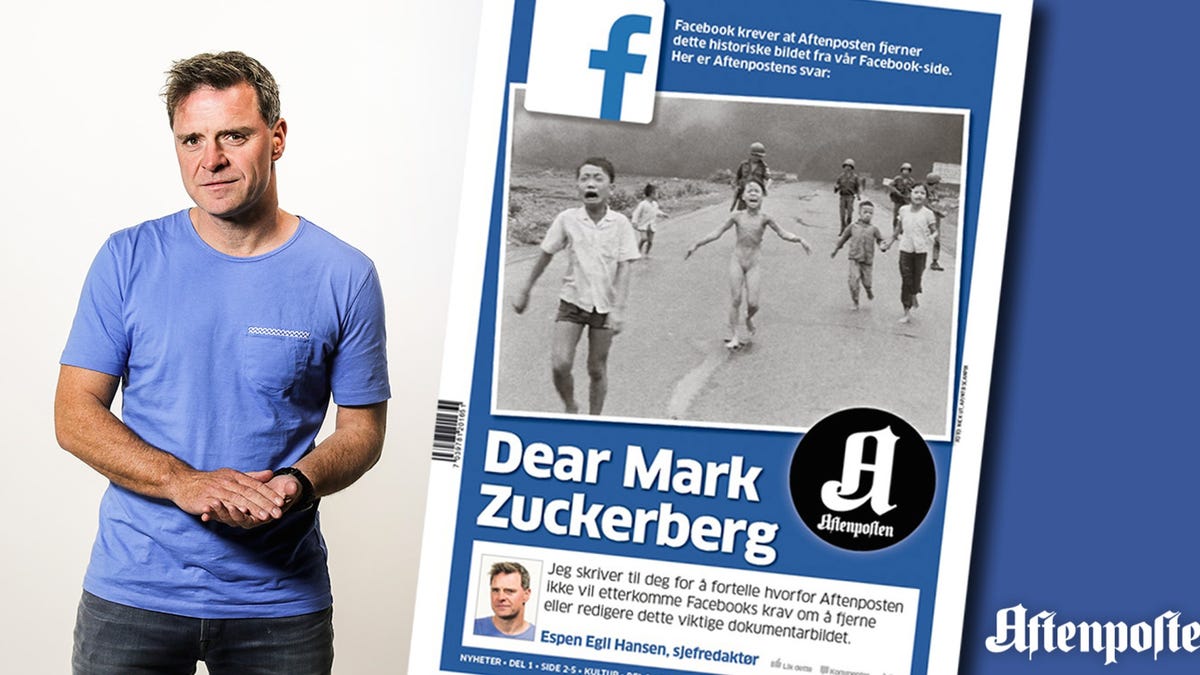Zuckerberg, you censored again: Norway's miffed over 'napalm girl' photo
After waves of criticism and protests on social media, Facebook reverses its decision to delete an iconic Vietnam War photo.
Facebook came out on the losing end of a dispute over an iconic war photo.
On Friday, Norway's largest newspaper went head to head with the massive social network, accusing it of censorship in a scathing front-page letter to Mark Zuckerberg.
In the letter, Aftenposten Editor in Chief Espen Egil Hansen called out Facebook's CEO over a Vietnam War photo that Hansen said the social network irresponsibly deleted.
"If you take the liberty to challenge Facebook's rules, you will be met -- as we have seen -- with censorship," Hansen said in his letter.
Later in the day, Facebook reversed its decision after waves of protest on social media.
That public outcry was just the latest criticism against Facebook as it continues to struggle with its influence over the flow of information. Although Zuckerberg doesn't consider Facebook a media company, its access to 1.7 billion active users gives the social network immense power over the news industry.
News stories and political content have become a particularly touchy subject. In May, for instance, the tech blog Gizmodo accused Facebook of purposely suppressing right-wing content. Then in August, in the first run for its Trending Topics algorithm after human editors were laid off, the top story was a fake article about Fox News anchor Megyn Kelly.
On Monday, Norway's Aftenposten published an article about seven photographs that changed the history of warfare, including one of a naked girl running after she was severely burned by napalm bombs in the Vietnam War. The Pulitzer Prize-winning image was shot by Nick Ut, then an Associated Press photographer.
Facebook deleted the article from an Aftenposten journalist's page and later on from the newspaper's page itself, claiming the image of the terrified girl violated the social network's rules against nudity.
"Any photographs of people displaying fully nude genitalia or buttocks, or fully nude female breasts, will be removed," Facebook wrote to Aftenposten.
Facebook users, including Norway's prime minister, Erna Solberg, took to posting the photo in protest of its removal. The social network had been deleting all the protest photos.
Solberg later reposted the image with a black square covering the naked girl, along with other historic photos with a similar masking, in a critique of the continuing censorship.
"They must see the difference between editing out child pornography and editing out history," Solberg told Reuters.
Following the uproar, Facebook changed its stance.
"Because of its status as an iconic image of historical importance," the company said in a statement, "the value of permitting sharing outweighs the value of protecting the community by removal, so we have decided to reinstate the image on Facebook where we are aware it has been removed."
Facebook said it would take a few days to adjust its review algorithm before the "napalm girl" photo could be posted again. The deleted posts from Solberg's Facebook page have not yet resurfaced, but Aftenposten posted the photo again just minutes after the social network announced its reversal.
Despite Zuckerberg's insistence as recently as last week that Facebook is not a media company or content provider, Hansen in his letter called the CEO the "world's most powerful editor" and accused him of acting irresponsibly.
"Facebook's Mission Statement states that your objective is to 'make the world more open and connected.' In reality, you are doing this in a totally superficial sense," Hansen wrote.
With its billion-plus users, Facebook has become one of the most important websites worldwide for the media. Hansen said he was frustrated by Facebook serving as gatekeeper for editorial work.
"I think you are abusing your power," he said, "and I find it hard to believe that you have thought it through thoroughly."
First published September 9 at 8:54 a.m. PT.
Update, September 9 at 10:59 a.m. PT: Added comment from Facebook.


